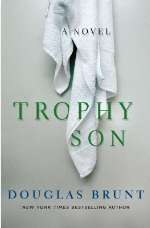Book review: The Trophy Son
 There was a lot of publicity around this novel by Douglas Brunt when it was released this summer, and I was curious to read it.
There was a lot of publicity around this novel by Douglas Brunt when it was released this summer, and I was curious to read it.
In this novel, we follow the story of tennis prodigy Anton Stratis. Andre is pushed into professional tennis by his overbearing father, who tried and failed to create a tennis star of his older son, but hits the bull’s eye with the second.
Although the story of obnoxious tennis parents is a familiar one – Andre Agassi, Steffi Graff, Jennifer Capriati, to name a few – I felt this story started out well, but seemed to drop the thread a little too quickly. It was too much a carbon copy of Agassi’s own story, but Anton is quickly able to use his father’s wealth to procure trainers and an entourage, thereby sidelining his father, and one major problem (and the one that provides the novel with its title) seems to disappear suspiciously quickly.
The book is well organized, following Anton’s ascent into the tennis world, showing how he will do everything it takes – including steroid use – to make it to the top. It’s a fast-paced and easy read, especially suited to summer reading.
What didn’t work for me were two elements. The first is that too many characters – including the protagonist, sadly – seemed strangely flat. This was a shame, because at the beginning, I was drawn in as a reader by a strong sense of voice. But this didn’t seem consistent throughout the novel. We are in Anton’s head, seeing the matches and the competition from his perspective, yet I often felt we were at arm’s length.
Perhaps it’s because Anton is always telling us things, rather than seeing them ourselves. There’s one segment where we are introduced to the fact that he suffers from obsessive compulsive disorder. This seems dropped fairly quickly, and then it’s mentioned in passing that he’s living with this but doesn’t suffer from it anymore. A forgotten thread? Even the romantic element was a bit flat, and I didn’t feel very interested in whether or not it would work out in the end.
As a reader, I was also bothered by the use of real tennis players’ names when there are allegations of steroid use. Up until that point, real tennis players are named in passing, but the top-seeded players/Anton’s rivals are fictitious. The author could have used that formula for the doping allegations, too.
I suspect it generates more ‘controversy’ to use real names, but as a reader I found it gimmicky, and too close to defamation for comfort. I hope this won’t become the norm in contemporary literature.
For me, these two elements kept this novel from being much better than it could have been, but it’s still a quick and enjoyable read.